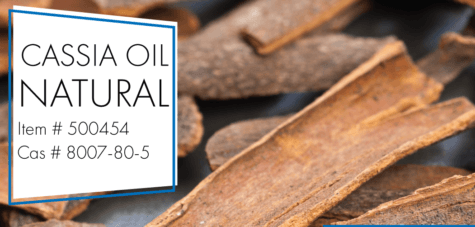Cassia Oil Natural
Item#: 500454 CAS: 8007-80-5
Odor Strength: Medium
Odor Description: Spicy, Alehydic, Woody, Resinous, Honey, Gourmand, Powdery
Taste Description: Spicy, Sweet, Aromatic, Aldehydic, Honey, Cinnamyl, Woody, Resinous
Cassia oil is a byproduct of the distillation of the bark of the Cinnamomum Cassia or Chinese Cinnamon tree. Due to the thickness of the bark, cassia tends to have a less delicate aroma when compared to its various cousins grown all across Asia.
Cassia’s flavor is comparable to the ground cinnamon, with the most significant difference being that cassia is naturally a lot sweeter and more potent. As a “hot oil,” cassia is known for its warm/spicy flavor, used in confectionery, desserts, pastries, and meats – as well as various curry dishes.
The Cassia Tree is most native to the Guangxi, Guangdong, and Yunnan provinces and is considered one of the 50 fundamental herbs in traditional Chinese medicine. When used internally, cassia will treat diarrhea, nausea, vomiting, and associated cramping. It will also help lower fevers, address G.I or urinary infections, and aid in reducing the symptoms of rheumatism. When inhaled, cassia’s warm and comforting scent has a grounding effect on the mind. Alleviating feelings of anxiety and depression and improving libido.
As mentioned above, cassia is considered a “hot” or caustic oil and must be diluted appropriately with a safe carrier before use. It also increases blood flow to the uterus and limits milk production in nursing mothers and should be avoided by those who are pregnant and nursing. The compound coumarin will cause blood-thinning, and those with clotting disorders should varify its safety with doctors.
Fun Fact: Most of the “cinnamon” sold in the US is Cassia.
If you are interested in seeing a sample or placing an order, please email Marietta Zino at mzino@vigon.com or call 570-422-6022.

